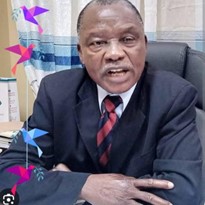Senator Thomas Yaya Nimely, a former rebel leader and current senator of Grand Gedeh County, delivered a poignant tribute at the funeral of Senator Prince Johnson, the founder of the INPFL rebel group. Nimely characterized Johnson’s death as a profound betrayal orchestrated by the Unity Party government under President Boakai. He argued that the government’s relentless pursuit of a War and Economic Crimes Court, intended to prosecute former warlords like Johnson and Nimely himself, placed immense pressure on Johnson, ultimately leading to his demise. Nimely painted a picture of a troubled man, haunted by the prospect of prosecution despite assurances of leniency in exchange for political support.
Nimely recounted a pattern of political bargaining where Johnson leveraged his influence to secure presidential victories for Ellen Johnson Sirleaf and George Weah in exchange for “buying time” – essentially, protection from prosecution. He claimed Johnson repeatedly confided in him, expressing anxiety over the broken promises and the looming threat of the War Crimes Court. Despite having the opportunity to pursue war crimes prosecutions, particularly during Sirleaf’s presidency with the presence of international peacekeepers, these leaders chose to prioritize political stability over accountability. This pattern, according to Nimely, established a precedent of impunity that was abruptly shattered under the Boakai administration.
Nimely emphasized Johnson’s desire for redemption and reconciliation, particularly between Nimba and Grand Gedeh counties, whose relationship remained strained due to Johnson’s role in the execution of President Samuel Doe, a native of Grand Gedeh. He pointed to Johnson’s two decades of preaching forgiveness and his efforts to build schools as evidence of his desire to atone for his past. However, the “Rescue” government, as Nimely termed it, failed to afford Johnson the same leniency granted by previous administrations. This betrayal, Nimely asserted, ultimately broke Johnson. He challenged those present to take up the mantle of reconciliation between the two counties, a goal he believed Johnson deeply cherished.
The historical context of the Liberian civil war underscores the complexity of the situation. The Truth and Reconciliation Commission recommended prosecution for several key figures, including Johnson and Nimely, for their roles in the brutal conflict. The capture and execution of President Doe by Johnson’s forces remains a deeply sensitive issue, particularly for the people of Grand Gedeh. The establishment of a War Crimes Court has been a long-standing demand by victims and human rights organizations, but successive governments have grappled with the political implications of holding powerful figures accountable. The accusations of political bargaining and the use of the court as a political tool further complicate the narrative.
The Bong County Chapter of Johnson’s Movement for Democracy and Reconstruction (MDR) party echoed Nimely’s sentiments, claiming their leader faced suppression from the Unity Party government until his death. This claim suggests a broader political dimension to Johnson’s demise, potentially implicating the ruling party in a deliberate effort to silence a powerful political figure. However, Vice President Jeremiah Koung refuted these accusations, asserting that Johnson was a supporter of the War Crimes Court, seeking to clear his name and deserved honor for his stance. This contradictory narrative highlights the deep divisions and competing interpretations surrounding Johnson’s legacy and the circumstances of his death.
The conflicting accounts of Johnson’s death and the accusations of political betrayal paint a complex picture of Liberian politics. The interplay of past war crimes, political maneuvering, and the pursuit of justice creates a volatile environment. The differing perspectives on the War Crimes Court and its potential impact on political stability further complicate the situation. While some see it as a necessary step towards accountability and reconciliation, others view it as a tool for political persecution. The unresolved tensions between Nimba and Grand Gedeh counties, exacerbated by Johnson’s role in President Doe’s death, add another layer of complexity to the narrative. The calls for reconciliation in the wake of Johnson’s passing highlight the ongoing struggle to heal the wounds of the past and build a more peaceful future for Liberia.














